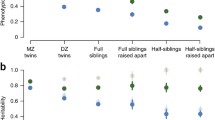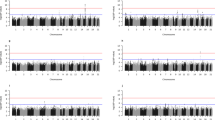Abstract
Age-related effects are often included as covariates in the analytical model for genome-wide association analysis of quantitative traits reflecting human health. Nevertheless, previous studies have hardly examined the effects of age on the proportion of variation explained by single nucleotide polymorphisms (PVSNP) in these traits. In this study, the PVSNP estimates of body mass index (BMI), waist-to-hip ratio, pulse pressure, high-density lipoprotein cholesterol level, triglyceride level (TG), low-density lipoprotein cholesterol level, and glucose level were obtained from Korean consortium metadata partitioned by gender or by age. Restricted maximum likelihood estimates of the PVSNP were obtained in a mixed model framework. Previous studies using pedigree data suggested possible differential heritability of certain traits with regard to gender, which we observed in our current study (BMI and TG; P < 0.05). However, the PVSNP analysis based on age revealed that, with respect to every trait tested, individuals aged 40 to 49 exhibited significantly lower PVSNP estimates than individuals aged 50 to 59 or 60 to 69 (P < 0.05). The consistent heterogeneous PVSNP with respect to age may be due to degenerated genetic functions in individuals between the ages of 50 and 69. Our results suggest the genetic mechanism of age- and gender-dependent PVSNP of quantitative traits related to human health should be further examined.



Similar content being viewed by others
References
Ben Ali S, Ben Yahia F, Sediri Y et al (2009) Gender-specific effect of Pro12Ala polymorphism in peroxisome proliferator-activated receptor gamma-2 gene on obesity risk and leptin levels in a Tunisian population. Clin Biochem 42:1642–1647
Chiba-Falek O, Nichols M, Suchindran S et al (2010) Impact of gene variants on sex-specific regulation of human Scavenger receptor class B type 1 (SR-BI) expression in liver and association with lipid levels in a population-based study. BMC Med Genet 11:9
Cho YS, Go MJ, Kim YJ et al (2009) A large-scale genome-wide association study of Asian populations uncovers genetic factors influencing eight quantitative traits. Nat Genet 41:527–534
Heid IM, Jackson AU, Randall JC et al (2010) Meta-analysis identifies 13 new loci associated with waist-hip ratio and reveals sexual dimorphism in the genetic basis of fat distribution. Nat Genet 42:949–960
Kang HM, Sul JH, Service SK et al (2010) Variance component model to account for sample structure in genome-wide association studies. Nat Genet 42:348–354
Korte A, Vilhjálmsson BJ, Segura V, Platt A, Long Q, Nordborg M (2012) A mixed-model approach for genome-wide association studies of correlated traits in structured populations. Nat Genet 44:1066–1071
Lavebratt C, Rydén M, Schalling M, Sengul S, Ahlberg S, Hoffstedt J (2002) The hormone-sensitive lipase i6 gene polymorphism and body fat accumulation. Eur J Clin Invest 32:938–942
Lee C, Pollak EJ (1997) Influence of partitioning data by sex on genetic variance and covariance components for weaning weight in beef cattle. J Anim Sci 75:61–67
Lee SH, Yang J, Goddard ME, Visscher PM, Wray NR (2012) Estimation of pleiotropy between complex diseases using single-nucleotide polymorphism-derived genomic relationships and restricted maximum likelihood. Bioinformatics 28:2540–2542
Lee SH, Yang J, Chen GB et al (2013) Estimation of SNP heritability from dense genotype data. Am J Hum Genet 93:1151–1155
Listgarten J, Lippert C, Kadie CM, Davidson RI, Eskin E, Heckerman D (2012) Improved linear mixed models for genome-wide association studies. Nat Methods 9:525–526
Luo BF, Du L, Li JX et al (2010) Heritability of metabolic syndrome traits among healthy younger adults: a population based study in China. J Med Genet 47:415–420
Memisoglu A, Hankinson SE, Manson JE, Colditz GA, Hunter DJ (2002) Lack of association of the codon 12 polymorphism of the peroxisome proliferator-activated receptor gamma gene with breast cancer and body mass. Pharmacogenetics 12:597–603
Pan L, Ober C, Abney M (2007) Heritability estimation of sex-specific effects on human quantitative traits. Genet Epidemiol 31:338–347
Parsch J, Ellegren H (2013) The evolutionary causes and consequences of sex-biased gene expression. Nat Rev Genet 14:83–87
Ryoo H, Lee C (2014) Underestimation of heritability using a mixed model with a polygenic covariance structure in a genome-wide association study for complex traits. Eur J Hum Genet 22:851–854
Ryoo H, Woo J, Kim Y, Lee C (2011) Heterogeneity of genetic associations of CDKAL1 and HHEX with susceptibility of type 2 diabetes mellitus by gender. Eur J Hum Genet 19:672–675
Speed D, Hemani G, Johnson MR, Balding DJ (2013) Response to Lee et al.: SNP-based heritability analysis with dense data. Am J Hum Genet 93:1155–1157
Vattikuti S, Guo J, Chow CC (2012) Heritability and genetic correlations explained by common SNPs for metabolic syndrome traits. PLoS Genet 8:e1002637
Yang J, Lee SH, Goddard ME et al (2011a) GCTA: a tool for genome-wide complex trait analysis. Am J Hum Genet 88:76–82
Yang J, Manolio TA, Pasquale LR et al (2011b) Genome partitioning of genetic variation for complex traits using common SNPs. Nat Genet 43:519–525
Yang J, Lee T, Kim J et al (2013) Ubiquitous polygenicity of human complex traits: genome-wide analysis of 49 traits in Koreans. PLoS Genet 9:e1003355
Yao C, Joehanes R, Johnson AD et al (2013) Sex- and age-interacting eQTLs in human complex diseases. Hum Mol Genet. doi:10.1093/hmg/ddt582
Acknowledgments
The valuable and constructive comments of anonymous reviewers on an earlier version of this article are greatly appreciated. We are grateful to the National Institute of Health in Korea for providing the genotypic and epidemiological data to the KARE Analysis Consortium. This study was supported by the Basic Science Research Program of the National Research Foundation of Korea (NRF) funded by the Ministry of Education, Science, and Technology (Grant No. 2012002096).
Conflict of interest
The authors have no competing interests.
Open access
This article is distributed under the terms of the Creative Commons Attribution License which permits any use, distribution, and reproduction in any medium, provided the original author(s) and the source are credited.
Author information
Authors and Affiliations
Corresponding author
About this article
Cite this article
Lee, D., Lee, C. Age- and gender-dependent heterogeneous proportion of variation explained by SNPs in quantitative traits reflecting human health. AGE 37, 19 (2015). https://doi.org/10.1007/s11357-015-9756-2
Received:
Accepted:
Published:
DOI: https://doi.org/10.1007/s11357-015-9756-2




